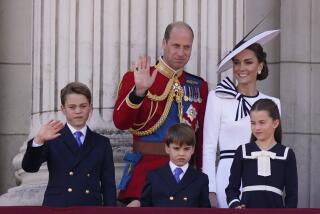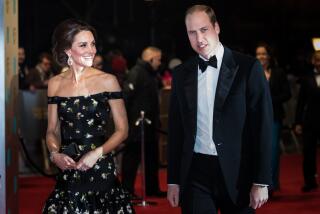Wedding music fit for a prince and his bride
Prince William and Catherine Middleton are stylish young Britons, well-placed to encourage the monarchy into the 21st century, beginning with their wedding Friday morning. Like the dress, the cake and the honeymoon, the details of the wedding music have been kept secret. William and Kate will no doubt have encountered a problem familiar to all engaged couples: balancing their taste with that of their respective families.
Elton John is invited, but since the Church of England does not allow secular music in a wedding ceremony proper, he will have to save “Candle in the Wind 3.0” for the private reception.
We know that the London Chamber Orchestra as well as the choirs of Westminster Abbey and St. George’s Chapel in Windsor will be performing, but the media doesn’t yet know what. In the absence of facts, we are free to speculate wildly. Hurrah!
The Walk
All Anglican services begin with a procession consisting of the crucifer and acolytes (the cross and candle bearers), the verger and the choir. The clergy usually follow, but in a wedding service, they wait for the bride and lead her and her father down the aisle as a separate group. In most royal weddings, the music has been a march for organ or Jeremiah Clarke’s “Prince of Denmark’s March.”
For a change, I’d plump for “Alla Hornpipe” from Handel’s “Water Music.” It’s jaunty, easily repeatable to match the walk and, best of all, takes advantage of all the fanfare trumpeters that will be on hand.
The Psalm
A psalm is included in nearly every Anglican service. It is generally read in smaller churches without a good choir, but in cathedrals, it is always sung. Psalm 67 — “May God be gracious to us and bless us and make his face to shine upon us” — is part of the 1662 Book of Common Prayer wedding liturgy and was therefore sung at the wedding service of the then-Princess Elizabeth and Prince Philip in 1947 as well as Prince Charles and Diana’s in 1981. This is one place where we might hear a new commission.
The Hymns
The sound of 1,900 guests mumbling through a hymn they don’t know would be decidedly unattractive and since most in the assembly aren’t likely regular churchgoers, sticking to the classics is ideal. A few other royals have chosen “Immortal, Invisible, God Only Wise,” but something a little more tuneful, such as “Love Divine, All Loves Excelling,” “Praise, My Soul, the King of Heaven” or “The Lord Is My Shepherd (Crimond)” seems a touch more modern.
The Crimond tune for “The Lord Is My Shepherd” was unknown when Elizabeth chose it for her wedding. Four days before the ceremony, Elizabeth and her sister, Margaret, summoned abbey organist William McKie and sang him the descant, so he could write it down for the choristers.
Anthem
If the father of the groom has anything to do with it, “I Was Glad” by Hubert Parry will be sung by the choir while William and Kate move to the high altar for prayers. Charles chose this piece for his wedding to Diana, and Parry is a favorite composer of his. Another possibility is the iconic “Jerusalem,” also by Parry, though it is too closely tied with sporting matches nowadays to be seriously considered for a royal wedding.
Signing of the Register
This is where the combined forces of two choirs, orchestra and organ really get to shine. It is possible that some of the music here will be a new commission, which, along with the choice of soloist, would give us a good indication of the new couple’s musical taste.
The field is wide open, but two rather lovely pieces are “Ubi caritas” by Maurice Duruflé and “Exsultate, Jubilate” by Mozart. “Ubi caritas” is for unaccompanied choir and begins and ends with the text “Where charity and love are, God is there.” “Exsultate, Jubilate” is for soprano and orchestra and sets a religious text, which means technically it is sacred music. The motet’s unapologetically impish coloratura, however, is straight out of Mozart’s opera playbook. The queen’s son Edward and his bride, Sophie Rhys-Jones, chose the Duruflé for their 1999 wedding, and his brother Andrew and Sarah Ferguson chose the Mozart in 1986.
Recessional
Elizabeth and Philip walked out to Mendelssohn’s “Wedding March” 64 years ago, but tastes have changed since then. The new cliché for royal and regular weddings alike is Charles Widor’s “Toccata” from “Symphony No. 5.” It’s French, it’s sparkly and it’s an excellent accompaniment for regally floating down the aisle on the arm of your prince.
Instructing the organist to turn it up to 11 for Alexandre Guilmant’s Grand Choeur in D Opus18 and J.S. Bach’s “In Dir Ist Freude” (In Thee Is Gladness) should be enough to encourage the guest to take their chitchat outside.
More to Read
The biggest entertainment stories
Get our big stories about Hollywood, film, television, music, arts, culture and more right in your inbox as soon as they publish.
You may occasionally receive promotional content from the Los Angeles Times.










